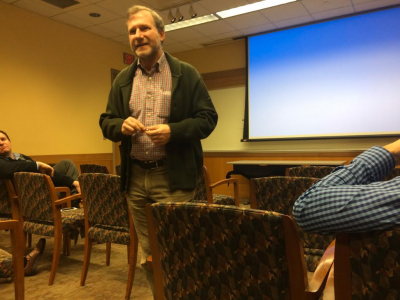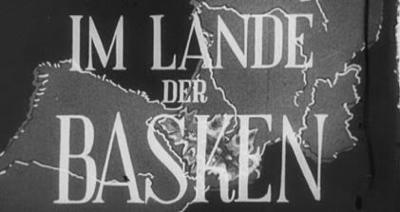On March 11th, 2016, award-winning author and historian Santiago de Pablo (University of the Basque Country) held a screening of his recent documentary film project titled Basque Swastika (in Spanish, Una esvástika sobre el Bidasoa). The 2013 film, directed by Javier Barajas and Alfonso Andrés Ayarza, is a fascinating exercise in metacinema, exploring the context and significance of a long-lost Nazi documentary on the topic of the Basque nation.
held a screening of his recent documentary film project titled Basque Swastika (in Spanish, Una esvástika sobre el Bidasoa). The 2013 film, directed by Javier Barajas and Alfonso Andrés Ayarza, is a fascinating exercise in metacinema, exploring the context and significance of a long-lost Nazi documentary on the topic of the Basque nation.
The original 22-minute Nazi film, released in 1944 under the title Im Lande der Basken (In the Land of the Basques), assumes a pseudo-anthropological perspective with regard to the Basque country, emphasizing the racial purity and communitarian character of its people as well as the isolated and idyllic landscape of the region. De Pablo was careful to point out that these optics exaggerate certain aspects of life in the region while ignoring others, such as area’s urban and industrial centers, in order to evoke a sense of mystical kinship with the Basques among a German audience.
Basque Swastika includes scenes from the Nazi documentary and other historical footage, along with interviews of people with significant links to Im Lande der Basken – among them Teresa Sandoval, the researcher who first rediscovered the obscure film in a Berlin archive, and Nicolas Brieger, son of the 1944 film’s director Herbert Brieger. This blend of sources yield a nuanced exposition of the Nazi film itself, as well as its creation and rediscovery, but the ultimate effect serves to preserve the air of mystery surrounding this very peculiar cinematic artifact.